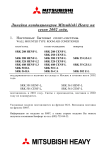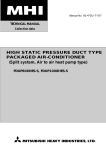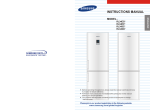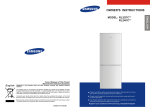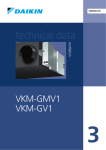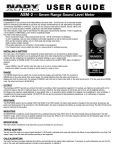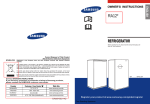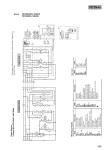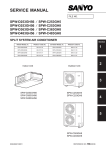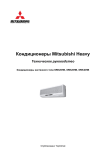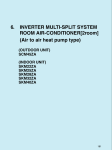Download Mitsubishi Heavy Industries FDC508HES3 Specifications
Transcript
18. FLOOR STANDING TYPE PACKAGED AIR-CONDITIONER Split system, Air to air heat pump type ( ) FDF508HES-SB 601 CONTENTS 18.1 GENERAL INFORMATION ........................................................................ 603 18.1.1 Specific features ................................................................................. 603 18.1.2 How to read the model name ............................................................. 603 18.2 SELECTION DATA ..................................................................................... 604 18.2.1 Specifications ...................................................................................... 604 18.2.2 Range of usage & limitations ............................................................. 605 18.2.3 Exterior dimensions............................................................................ 606 18.2.4 Exterior appearance............................................................................ 608 18.2.5 Piping system ...................................................................................... 609 18.2.6 Selection chart .................................................................................... 610 18.2.7 Noise level ........................................................................................... 611 18.3 ELECTRICAL DATA ................................................................................... 612 18.3.1 Electrical wiring .................................................................................. 612 18.4 OUTLINE OF OPERATION CONTROL BY MICROCOMPUTER ............. 613 18.5 APPLICATION DATA ................................................................................. 613 18.5.1 Installation of indoor unit ................................................................... 614 18.5.2 Installation of outdoor unit................................................................. 616 18.6 MAINTENANCE DATA ............................................................................... 616 602 18.1 GENERAL INFORMATION 18.1.1 Specific features (1) Less refrigerant charge amount due to use of double phase refrigerant flow system. The total refrigerant charge amount has been reduced by more than 50%. (2) The indoor outdoor interconnection signal wiring has been done away with. The microcomputer chip is installed in the indoor and outdoor unit. There is no need for the unit to communicate between the outdoor and indoor units so the unit is more resistant to electromagnetic noise thus the incidence of microcomputer malfunction has been reduced. The compressor in the outdoor unit has its own self protection function, that reacts according to abnormal high pressure and excessive high temperature. (3) All models have service valves protruding from the outdoor unit for faster flare connection work in the field. (4) The connecting piping can have a 4-way off-take. The direction of the off-take can meet the installation conditions. Selection can be made from among all directions: left, right, rear-right and floor pull-out. This provides a wide range of installation freedom. (5) Auto-Swing Design Used. Adjustment is automatic to a maximum of 90° in the left and right direction. Up/down adjustment is done manually. Adjustment can be made to 20° in the up direction and 30° in the down direction. 18.1.2 How to read the model name Example: FDF 50 8 H ES -SB Applicable power source... See the specifications Heat pump type Series No. Product capacity Model name FDF : Floor standing type FDC : Outdoor unit 603 18.2 SELECTION DATA 18.2.1 Specifications Model FDF508HES-SB FDF508HES-SB Model Item FDF508H Nominal cooling capacity(1) W Nominal heating capacity(1) W FDC508HES3B 12500 14000 Power source 3 Phase, 380V, 50Hz Operation data(3) Cooling input kW 5.42 Running current (Cooling) A 9.8 Power factor (Cooling) % 84 kW 4.97 Running current (Heating) A 9.3 Power factor (Heating) % 81 Inrush current (L.R.A) A Heating input Noise level(4) Exterior dimensions Height × Width × Depth Net weight Refrigerant equipment Compressor type & Q’ty Motor 74 dB(A) Hi: 49 Lo: 45 55 mm 1850 × 600 × 350 1250 × 920 × 340 kg 46 101 — GU-A5570ES41 × 1 kW Starting method Heat exchanger — 3.75 — Line starting Louver fines & inner grooved tubing Refrigerant control Slitted fines & bare tubing Capillary tube Refrigerant R22 Quantity Refrigarant oil kg — r — 1.9 [Pre-charged up to the piping length of 5m] 1.6 (BARREL FREEZE 32SAM) Defrost control IC controlled de-icer High pressure control High pressure switch Air handling equipment Sirocco fan × 1 Fan type & Q’ty Moter W Starting method Air flow (Standard) CMM Fresh air intake Air filter, Q’ty Shock & vibration absorber Electric heater Operation control Operation switch Room temperature control 130 × 1 65 × 2 Line starting Line starting Hi: 28 Lo: 23 110 Unavailable — Polypropylene net (washable) — Rubber sleeve (for fan motor) Rubber mount (for compressor) — 40 (Crank case heater) Control switch – (Indoor unit side) — (Can be incorporated: PTC Heater 2.2 kW) — W Electric heater Propeller fan × 2 Thermostat by electronics Safety equipment Internal thermostat for fan motor Frost protection thermostat. Installation data Refrigerant piping size mm (in) — Internal thermostat for fan motor. Abnormal discharge temperature protection. Liquid line: φ9.52 (3/8″) Gas line: φ19.05 (3/4″) Connecting method Flare piping Drain hose (Connectable with VP20) Insulation for piping — Neccessary (both Liquid & Gas lines) Accessories Mounting kit. Optional parts Electric heater Notes (1) The data are measured at the following conditions. Item Operation Cooling Heating Indoor air temperature DB WB 27˚C 19˚C 20˚C — Outdoor air temperature DB WB 35˚C 24˚C 7˚C 6˚C Standards ISO-T1 JIS B8616 (2) This packaged air conditioner is manufactured and tested in conformity with the following standard. ISO-T1 "UNITARY AIR CONDITIONERS" (3) The operation data indicate when the air-conditioner is operated at 380V 50Hz. (4) Indicators the value at mild mode. 604 18.2.2 Range of usage & limitations Model FDF508HES-SB Item Indoor return air temperature (Upper, lower limits) Refer to the selection chart Outdoor air temperature (Upper, lower limits) Refrigerant line (one way) length Vertical height difference between outdoor unit and indoor unit Power source voltage Voltage at starting Max. 50 m Max. 30 m (Outdoor unit is higher) Max. 15 m (Outdoor unit is lower) Rating ± 10% Min. 85% of rating Frequency of ON-OFF cycle Max. 10 times/h ON and OFF interval Min. 3 minutes 605 18.2.3 Exterior dimensions (1) Indoor unit Model FDF508H Unit: mm Opening for exit piping & wiring (Bottom) (ø88) 1000 100 280 274 290 298 50 Space for installation and service 50 Service space 600 Drain (VP20) 30 30 600 62 50 Gas piping ø19.05 (3/4") Liquid piping ø9.52 (3/8") 76 600 480 340 269 350 60 60 Control switch 175 635 250 Gas piping 835 Liquid piping ø9.52 (3/8") 100 40 145 100 615 ø19.05 (3/4") 540 770 1850 526.5 Drain (VP20) 75 560 Opening for exit piping & wiring (Rear) (ø88 knockout) 606 220 330 Opening for exit piping & wiring (ø88 knockout on both side) (2) Outdoor unit Model FDC508HES3B Unit: mm Liquid piping: ø 9.52 (3/8") (Flare connecting) 46 100 48 50 Gas piping: ø 19.05 (3/4") (Flare connecting) Terminal block Liquid piping: ø 9.52 (3/8") (Flare connecting) Gas piping: ø 19.05 (3/4") (Flare connecting) Opening for electric wiring 1250 A 55 50 110 578 195 50 Opening for piping and electric wiring 50 10 195 110 555 Opening for electric wiring 50 50 27 15 Opening for piping and electric wiring 920 Holes for anchor bolt (M10 × 4pcs.) 580 175 15 103 295 50 15 Holes for drain (ø 20 × 3pcs.) 50 237 Opening for piping and electric wiring 70 50 Electric wiring 150 47 35 35 55 15 380 340 15 165 15 Opening for electric wiring 40 50 VIEW A Required space for service and air flow Minimum allowable space to the obstacles Unit:mm L3 L2 Installation type Air inlet L4 Air inlet L1 Service space I II III L1 Open Open 500 L2 300 5 Open L3 150 300 150 L4 5 5 5 Mark Air outlet Notes (1) Avoid the location where four sides are entirely surrounded by walls. (2) Fix the unit by anchor bolts without fail. Restrict the protrusion length of anchor bolt to 15 mm and under. (3) When strong wind blows against the unit, direct the discharge port at a right angle to the wind direction. (4) Secure the space of 1 m and over at the top of unit. (5) Make the height of obstruction wall in front of discharge port lower than the height of unit. 607 18.2.4 Exterior appearence (1) Indoor unit Model FDF508H Air outlet grille Ceramic white Front panel Ceramic white Side panel Ceramic white Air inlet grille Ceramic white Bottom panel Warm gray (2) Outdoor unit Model FDC508HES3B Polar white 608 18.2.5 Piping system Model FDF508HES-SB High pressure switch (63H2) (For fan motor control) Indoor unit Cooling cycle 4-way valve Strainer Gas line (ø19.05) Outdoor unit Heating cycle Thermistor (ThO-A) Service valve (Flare connecting) Check joint Check joint Thermistor (ThI-A) Capillary tube Oil separator Thermistor (ThO-D) Heat exchanger Capillary tube Thermistor (ThI-R) Compressor Capillary tube Heat exchanger Check joint Capillary tube Subcooling coil Solenoid valve (SV1) Strainer Liquid line (ø9.52) Accumulators Solenoid Thermistor valve (SV2) (ThO-R) Check valve Strainer Strainer Service valve (Flare connecting) Capillary tube Flare connecting Preset point of the protective divices Parts name Thermistor (for protection over loading in heating) Mark ThI-R Equipped unit FDF508HES-SB OFF ON 68 °C 61 °C OFF ON 2.5 °C 10 °C Indoor unit Thermistor (for frost prevention) Thermistor (for detecting discharge pipe temp.) ThO-D Outdoor unit OFF ON 135 °C 90 °C Thermistor (for detecting heat exchanger temp.) ThO-R Outdoor unit OFF ON 70 °C 60 °C High pressure switch (for controlling FMo) 63H2 Outdoor unit OFF 2.50MPa ON 2.06MPa 609 18.2.6 Selection chart Correct the cooling and heating capacity in accordance with the conditions as follows. The net cooling and heating capacity can be obtained in the following way. Net capacity = Capacity shown on specification × Correction factors as follows. Coefficient of cooling and heating capacity in relation to temperature (1) Coefficient of cooling and heating capacity in relation to temperatures Cooling Heating Cooling operation Outdoor air D.B. temperature (˚CD.B.) Heating operation Indoor air D.B. temperature (˚CD.B.) Applicable range Indoor air W.B. temperature (˚CW.B.) ISO-T1 Standard condition ISO-T1 Standard condition Outdoor air W.B. temperature (˚CW.B.) (a) Table of bypass factor Item Model FDF508HES-SB High 0.032 Low 0.022 Air flow (2) Correction of cooling and heating capacity in relation to air flow rate control (fan speed) Coefficient: 1.00 at High, 0.95 at Low (3) Correction of cooling and heating capacity in relation to one way length of refrigerant piping It is necessary to correct the cooling and heating capacity in relation to the one way equivalent piping length between the indoor and outdoor units. Equivalent piping length (1) m 7.5 10 15 20 25 30 35 40 45 50 55 Heating 1.0 1.0 1.0 1.0 1.0 0.998 0.998 0.993 0.993 0.988 0.988 Cooling 1.0 0.995 0.980 0.970 0.955 0.945 0.930 0.920 0.905 0.895 0.880 Note (1) Equivalent piping length can be obtained by calculating as follows. [φ19.05(3/4″)]: Equivalent piping length = Real piping length + (0.15 × Number or bends in piping) [Equivalent piping length < Limitation length of piping + 5m] 610 (4) When the outdoor unit is located at a lower height than the indoor unit in cooling operation and when the outdoor unit is located at a higher height than the indoor unit in heating operation, the following values should be subtracted from the values in the above table. Height difference between the indoor unit and outdoor unit in the vertical height difference 5m 10m 15m 20m 25m 30m Adjustment coefficient 0.01 0.02 0.03 0.04 0.05 0.06 Piping length limitations Model FDF508HES-SB Item Max. one way piping length 50m Max. vertical height difference Outdoor unit is higher : 30m, Outdoor unit is lower : 15m Note (1) Values in the table indicate the one way piping length between the indoor and outdoor units. How to obtain the cooling and heating capacity Example : The net cooling capacity of the model FDF508HES-SB with the air flow “High”, the piping length of 15m, the outdoor unit located 5m lower than the indoor unit, indoor wet-bulb temperature at 19.0 ˚C and outdoor dry-bulb temperature 35 ˚C is Net cooling capacity = × 12500 FDF508HES-SB × 1.00 Air flow “High” × (0.98 - 0.01) 1.0 12125 w = Length 15m. Height difference 5 m Factor by air temperatures 18.2.7 Noise level Notes (1)The data are based on the following conditions. Ambient air temperature: Indoor unit 27°C DB, 19°C WB Outdoor unit 35°C DB, Indoor unit Measured based on JIS B 8616 Mike position as below Microphone 1m 1m Indoor unit Outdoor unit Measured based on JIS B 8616 Mike position: at highest noise level in position as below Distance from front side 1m Height 1m (2) The data in the chart are measured in an unechonic room. (3) The noise levels measured in the field are usually higher than the data because of reflection. (1) Indoor unit Model (2) Outdoor unit Model FDF508H Noise level 49 dB (A) at HIGH 45 dB (A) at LOW FDC508HES3B Noise level 55 dB (A) 70 70 70 70 N70 N70 60 60 N60 50 50 N50 40 40 N40 30 30 N2 125 250 500 60 N60 50 50 N50 40 40 N40 30 30 N30 0 20 63 Souud pressure level (standard 0.0002µbar) Souud pressure level (standard 0.0002µbar) 60 1000 2000 4000 Mid octave band frequency (Hz) N2 20 8000 N30 0 20 63 125 250 500 1000 2000 4000 20 8000 Mid octave band frequency (Hz) 611 RD X05 X08 X04 X07 BL X06 X03 WH 1 2 BK/WH 3 28 RD/WH H L UH X02 X03 X04 Mark CFI CFO1,2 CH CM CnA ~ Z CT1,2 F FMI FMO1,2 LED LM LS NR SSR PC SV1,2 SW SW3 TB ThI-A CF01 12 13 H L UH (49FO2) FMO2 Parts name Capacitor for FMI Capacitor for FMO Crankcase heater Compressor motor Connector ( mark) Current sensor Fuse Fan motor (indoor unit) Fan motor (outdoor unit) Indication lamp Louver motor Limit switch Surge suppressor Auxiliary relay (for LM) Photo coupler Solenoid coil (for control) Switch (ON/OFF) Changeover switch Terminal block ( mark) Thermistor Meaning of marks Printed circuit board X02 W CT2 CM V WH X01 CT1 RD WH U (49FO1) FMO1 OR/WH Y/GN BL 6 OR/WH 4 CF02 52C BR BK SV1 X08 22 26 27 7 6 Vao Tro BK/WH BR/WH BL/WH Tho-R Tho-D Tho-A 14V CnA1 CnA2 (Checker) CnE Parts name X07 23 25 63H2 Auxiliary relay Auxiliary relay High pressure switch (for control) Terminal (F) Connector Indication lamp (Green) Indication lamp (Red) 21 SV2 X3~7 X01~08 63H2 v ■ LED-G LED-R X06 20 A2 Thermistor Thermistor Thermistor Thermistor Transformer (indoor unit) Transformer (outdoor unit) Varistor Varistor 4-way valve solenoid Internal thermostat for FMI Internal thermostat for FMo Magnetic contactor for CM X01 19 18 A1 BR/WH Mark ThI-R Tho-A Tho-D Tho-R TrI TrO Val Vao 20S 49FI 49FO1,2 52C X05 17 16 14 15 20S GR 2 BK 5 GR BK BK 3 BL 1 BL 52C BL N P NR BK BK/WH BL BK/RD 3 4 5 3 4 5 Mark BK BL BR GR OR P RD WH WH BR BL BK 9 2 1 14 10 Color Black Blue Brown Gray Orange Pink Red White 2 TB RD 1 2/N TB 1 Color mark (Run) LED-G (Check) LED-R CnL BK X6 CnZ LM 3 CnZ Mark BK/RD BK/WH BL/WH BR/WH OR/WH RD/WH Y/GN PC X5 L 8 X3 OR CnF1 OR OR X7 CFI X3 X6 X4 X7 X5 Color Black/Red Black/White Blue/White Brown/White Orange/White Red/White Yellow/Green 5 6 OR CnF1 FMI (49FI) H 7 X4 Indoor Unit BK / WH RD/WH Y/GN L2 WH L3 BL BK BL BR WH OR OR CnM1 BK BL BR WH OR OR CnM2 RD F(3.15A) DR CH BR CnR BK/RD PC BL/WH PC DR 220V P Outdoor Unit BK Val BK CnW1 SW3 OFF 1 2 3 4 ON 12V BR CnW2 Tr I BK RD CnQ Test 220V Printed circuit board 13 PC GR TB L1 RD Y / GN SSR OR OR WH WH RD / WH RD Y / GN BL / WH BL WH WH CnT CnH CnN CnB 612 CnS BL CnZ BL BL BL CnK2 (3) CnB2 CnN RD RD (3) BK BK BK BK ThI–A Option LS SW Option Control switch LED ThI–R 52H XR5 XR3 XR1 BK BK CnH2 XR4 XR2 Model CnO Power source 3 Phase 380V 50Hz 18.3 ELECTRICAL DATA 18.3.1 Electrical wiring FDF508HES-SB 18.4 OUTLINE OF OPERATION CONTROL BY MICROCOMPUTER This is same as FDUR heat pump series. Refer to page 306. 18.5 APPLICATION DATA SAFETY PRECAUTIONS • Please read these “Safety Precautions” first then accurately execute the installation work. • Though the precautionary points indicated herein are divided under two headings. WARNING and CAUTION , those points which are related to the strong possibility of an installation done in error resulting in death or serious injury are listed in the WARNING section. However, there is also a possibility of serious consequences in relationship to the points listed in the CAUTION section as well. In either case, important safety related information is indicated, so by all means, properly observe all that is mentioned. • After completing the installation, along with confirming that no abnormalities were seen from the operation tests, please explain operating methods as well as maintenance methods to the user (customer) of this equipment, based on the owner’s manual. Moreover, ask the customer to keep this sheet together with the owner’s manual. WARNING • This system should be applied to places of office, restaurant, residence and the like. Application to inferior environment such as engineering shop could cause equipment malfunction. • Please entrust installation to either the company which sold you the equipment or to a professional contractor. Defects from improper installations can be the cause of water leakage, electric shocks and fires. • Execute the installation accurately, based on following the installation manual. Again, improper installations can result in water leakage, electric shocks and fires. • When a large air-conditioning system is installed to a small room, it is necessary to have a prior planned countermeasure for the rare case of a refrigerant leakage, to prevent the exceeding of threshold concentration. In regards to preparing this countermeasure, consult with the company from which you perchased the equipment, and make the installation accordingly. In the rare event that a refrigerant leakage and exceeding of threshold concentration does occur, there is the danger of a resultant oxygen deficiency accident. • For installation, confirm that the installation site can sufficiently support heavy weight. When strength is insufficient, injury can result from a falling of the unit. • Execute the prescribed installation construction to prepare for earthquakes and the strong winds of typhoons and hurricanes, etc. Improper installations can result in accidents due to a violent falling over of the unit. • For electrical work, please see that a licensed electrician executes the work while following the safety standards related to electrical equipment, and local regulations as well as the installation instructions, and that only exclusive use circuits are used. Insufficient power source circuit capacity and defective installment execution can be the cause of electric shocks and fires. • Accurately connect wiring using the proper cable, and insure that the external force of the cable is not conducted to the terminal connection part, through properly securing it. Improper connection or securing can result in heat generation or fire. • Take care that wiring does not rise upward, and accurately install the lid/service panel. Its improper installation can also result in heat generation or fire. • When setting up or moving the location of the air conditioner, do not mix air etc. or anything other than the designated refrigerant within the refrigeration cycle. Rupture and injury caused by abnormal high pressure can result from such mixing. • Always use accessory parts and authorized parts for installation construction. Using parts not authorized by this company can result in water leakage, electric shock, fire and refrigerant leakage. CAUTION • Execute proper grounding. Do not connect the ground wire to a gas pipe, water pipe, lightning rod or a telephone ground wire. Improper placement of ground wires can result in electric shock. • The installation of an earth leakage breaker is necessary depending on the established location of the unit. Not installing an earth leakage breaker may result in electric shock. • Do not install the unit where there is a concern about leakage of combustible gas. The rare event of leaked gas collecting around the unit could result in an outbreak of fire. • For the drain pipe, follow the installation manual to insure that it allows proper drainage and thermally insulate it to prevent condensation. Inadequate plumbing can result in water leakage and water damage to interior items. 613 NOTICE All Wiring of this installation must comply with NATIONAL, STATE AND LOCAL REGULATIONS. These instructions do not cover all variations for every kind of installation circumstance. Should further information be desired or should particular problems occur, the matter should be referred to Mitsubishi Heavy Industries, Ltd. through your local distributor. WARNING BE SURE TO READ THESE INSTRUCTIONS CAREFULLY BEFORE BEGINNING INSTALLATION. FAILURE TO FOLLOW THESE INSTRUCTIONS COULD CAUSE SERIOUS INJURY OR DEATH, EQUIPMENT MALFUNCTION AND/OR PROPERTY DAMAGE. 18.5.1 Installation of indoor unit Request ™Please do not install and use the air-conditioning equipment in locations such as the following: (1) In the vicinity of equipment which generates electromagnetic waves, such as that often found in hospitals, or in the vicinity of equipment which generates high frequency waves: Installation in such locations is to be avoided as the generation of electromagnetic noise can cause the controller to operate incorrectly. (2) Areas which are exposed to salt air wind, such as coastal regions: Salt air can accelerate the corrosion of outer plating and the heat exchanger. (3) Kitchens, machinery plants, and other similar locations where splashing and/or spraying of oil and grease occurs frequently or where a large amount of heated air is present: Grease and hot air can easily enter and disrupt the operation of the indoor unit, and thus, the unit should not be installed in such locations. In addition, these factors can also lead to reduced performance and/or corrosion of the heat exchanger as well as resulting in damage to plastic parts. (4) Any location where there is a possibility that corrosive gasses (sulfurous acid, etc.) or inflammable gasses (paint thinner vapor or gasoline vapor, etc.) could be produced or could accumulate; also, installation and use of this air conditioner equipment in locations where volatile inflammable substances are handled is to be avoided: These factors can lead to corrosion of the heat exchanger and to damage to plastic parts. In addition, there is also a possibility that inflammable gasses could be ignited in the presence of the air-conditioner. ™If spatter generated during welding and other similar operations comes into contact with the indoor unit, it may result in the unit being damaged. Therefore, in addition to requesting that the utmost care be taken when performing this type of work in the vicinity of the air-conditioner equipment, it is also requested that the unit be covered to prevent spatter from passing to its interior. CAUTION ™It is important that the following safety precautions be followed during installation of the air-conditioning equipment: ¡Do not place the air conditioner’s remote control unit in any location where it will be exposed to direct sunlight as this can cause the remote control unit to be damaged or warped. ¡The equipment must be grounded; the ground wire should not be connected to either gas pipe, water pipe, lightning rod, or telephone ground wires. Incorrect operation of the air conditioner or electric shocks can result if the grounding is not performed correctly. ¡An earth leakage breaker is required to be fitted in order to provide protection against the possibility of electric shocks, fires, and other similar accidents. ¡Ensure that the air conditioner is securely installed in a location which is fully capable of supporting its weight. Failure to do so could result in a number of different problems such as the unit toppling over and causing injury or generating increased operation noise due to vibration. ¡If there is a possibility that the in-door unit’s refrigerant concentration could exceed the threshold concentration (0.3 kg/m3) and result in suffocation should a leakage of this gas occur, it will be necessary to provide an opening between the room containing the indoor unit and neighboring rooms or to provide mechanical ventilating equipment which operates in response to gas leak warnings. Consult with staff at your local sales outlet when purchasing such products. (1) Selection of a suitable installation location (a) Installation space The dimensions shown below are the minimum which must be available for installation of the indoor unit. 50 Unit: mm 100 1000 50 Service space 614 50 600 600 Request Obtain the consent of the customer to install the indoor unit in a location which satisfies the following conditions: ¡ Warm and cold air must be able to WARNING dissipate freely. ¡ It must be possible to easily ¡ Install the indoor securely in a location connect wiring and piping to the which is fully capable of supporting its outdoor. weight. Installing in a location which is ¡ The installation of a drain must be not sufficiently reinforced or supported possible. may result in the indoor unit toppling and ¡ The section of floor for installation falling, resulting in damage or injury. must be sufficiently reinforced. ¡ Direct sunlight must not fall on the in-door unit. Request ¡ There must be no obstacles or ¡ It is important that enough space is blockages in the vicinity of the provided for performing maintenance suction air and discharge air operations. openings. ¡ There must be no possibility of faulty operation of a fire alarm, as must there be no possibility of short circuits. (2) Transporting and installing the unit (a) Transporting Front surface facing upward Request ¡ When transporting the unit to the final mounting location, keep it in its original packing as long as feasible. ¡ When the situation demands that the unit be unpacked for transportation, wrap using nylon sling and take care to ensure that the unit is not damaged. Note (1) Do not hold the unit by the air inlet grill, by the air outlet grill, or by any other plastic parts. ¡ When placing the unit down after packaging has been removed, please ensure that it is always positioned with the front surface facing upward. (b) Topple prevention overview Request Tapping screws ¡ Mount the unit on a level surface; forward, Topple preventer backward, left, or right inclinations must not (Secured with round wood screws) The unit will topple over quite easily; it must be secured in place as illustrated. L-angle (3) Refrigerant piping exceed 1˚. Please refer to the outdoor unit’s instruction manual with regard to the installation of refrigerant piping. (b) Control box position and power cord path Control box (a) Piping and wiring outlets Control box For rear pull-out (1 location) (φ 88 knockout hole) For bottom pull-out (φ 88) (φ 88 knock-out hole) For side pull-out (left and right) Clamp ¡ Remove the suction grill to find the control box in the position indicated in the diagram above. Remove the cover to perform the necessary work. ¡ The power line must pass through the clamp and be secured by the clamp. 615 (4) Drain piping WARNING ¡ The drain must not be allowed flow into any drainage systems where sulfurous or any other types of poisonous gas may be present as it could result in these gasses passing to the interior of the air conditioned room. Request ¡ The drain piping should be insulated to prevent the occurrence of condensation. (This applies particularly to the indoor unit itself and the unit’s interior.) ¡ Install the piping sloping downwards (with an declination of between 1/50 and 1/100); in addition do not create any traps or rises along the length of the piping. CAUTION ¡ Follow carefully the instructions in the installation manual to ensure that the drain is securely installed in a manner which allows free flow of water and also that it is correctly insulated to prevent condensation. Failure to install the drain correctly can lead to the leakage of water and subsequent damage to household goods. ¡ Use commercially available VP-20 rigid PVC pipe for the drain piping. No rises No traps Do not place the end in water. Make the drain piping short and downward. (5) Electrical wiring • Electrical wiring operations are to be performed in accordance with the directions given in the outdoor unit’s installation manual. By switching the dip switch (SW3-3) on the indoor unit printed circuit board (“Specify the following switch number.”), the operation mode can be changed to the quiet mode (mild mode). Confirm at installation and change if necessary. 18.5.2 Installation of outdoor unit This is same as FDUR heat pump series. Refer to page 330. 18.6 MAINTENANCE DATA This is same as FDUR heat pump series. Refer to page 340. 616
















